Before, People would look for a hotel around them or dial after seeing an ad printed somewhere. But all these have been changed with the Internet, digitalization, and facilities which have been tailormade for SEO — customers simply log into search engines such as Google or Bing and find hotels that answer all their explicit requirements.
All it takes is a click on your website, and they can complete their booking.
But it isn’t that simple for hotels.
SEO best practices change so fast that keeping your SEO marketing campaigns effective is tricky. Your hotel website can look gorgeous but be useless if nobody sees it – particularly if you haven’t built a great reputation for your hotel either locally or globally yet.
However, with SEO you build that reputation and connect to the customers, and they will make sure your hotel becomes the choice for them.
So, let us first understand what Search Engine Optimization is for a hotel.
Table of Contents
ToggleWhat is SEO for Hotels?
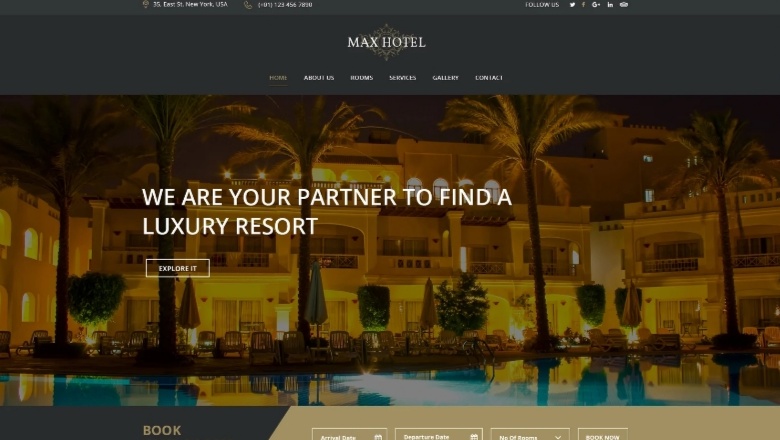
Search Engine Optimization for hotels is basically a strategy that can help you in raising your hotel’s ranking and visibility on search engines. In actual fact, the primary objective here is to raise the number of visitors to the hotel’s website by organic search results and, above all, increase traffic and hotel bookings.
Since search engine rankings constantly change, SEO must be a long-term strategy that requires continuous commitment. Without ongoing SEO efforts, your hotel’s search rankings might decline as competitors surpass you in the search results.
This means that SEO should be an inseparable part for your hotel, especially if you want to attract customers and surpass your competitors.
Why Optimise your Hotel Website?
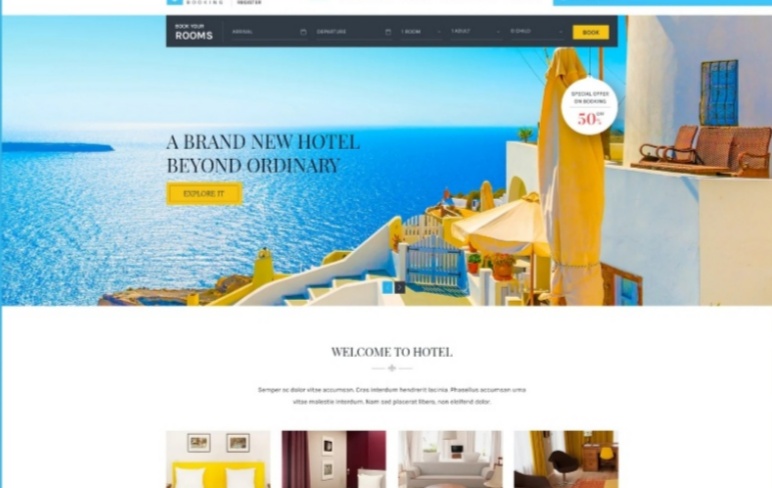
Optimising your hotel website is important as it improves your visibility, making it easier for customers to find you— and effectively satisfying their needs.
As per Backlinko, only the #1 result in Google gets 31.7% of all the clicks, while the last result on the first pages receives a mere 2.2%.
As you can see, being on the front page of Google is important— making SEO for your hotel’s website your best strategy!
By ranking higher, you can not only increase your chances of appearing on the first page but also attract more qualified leads. For instance, someone searching for a hotel with specific features in a particular location is highly likely to find your optimised website at the top of their search results. Ultimately, effective SEO for your hotel drives more traffic to your site, increases hotel bookings, and converts prospects into customers.
How to do SEO for Hotel Websites?
When the customer is just beginning to contemplate their next trip, SEO-optimised content is a great way to engage your audience. Here’s how you can do it:
1) Understand the nature of hotel SEO

Hotel SEO is distinct from other types of businesses. It focuses on a highly competitive and location-specific market. Unlike typical e-commerce and service-based businesses, hotels must cater to both local and international travellers. Customers are looking for experiences, not just products— meaning that your SEO strategy must be tailored to grab their attention, from initial research to booking.
| Key consideration: Define your target audience— who they are, what they like, and their booking patterns. Different types of accommodations attract different audiences. For instance, a resort may attract leisure travellers while a serviced apartment might be more appealing to business travellers. |
2) Conduct keyword research
Now that you have determined your audience, identify keywords and phrases that your customers might use while searching for a hotel. Before going further with the types of keywords, let’s look at the intent of users’ searches: commercial, navigational, and informational.
a. Commercial intent is when users are looking to make a purchase. Such keywords include phrases like ‘buy,’ ‘book,’ or ‘price.’
b. Navigational intent is when the audience is looking for a specific website or brand. They want to navigate to a particular business’ site. They generally include the business’ name in the search.
c. Informational intent is when searchers are finding information or answers to their questions. Such keywords are ‘how to,’ or ‘best practices’ keywords. Such content helps users who are gathering information before making a booking.
And sometimes, it can be a mix of the above keywords. For instance, this blog serves two of your purposes– informational and commercial. You can not only learn how to do SEO for your hotel but also make a decision if you want to start doing it.
Since we now understand search intent, let’s explore the different types of keywords to use when optimising your hotel’s website.
-
Broad keywords
General terms like “hotels in Bangalore” or “luxury accommodations.” While keywords like these attract high search volumes, they also come with heavy competition. These keywords are great for building brand visibility, but they may not always convert well since they attract a ‘broad’ audience.
-
Long-tail keywords
Long-tail keywords are more specific search phrases like “pet-friendly hotels in Bangalore” or “boutique hotels with rooftop bars.” Unlike broad keywords, these have lower search volumes but are highly targeted, hence attracting users who are closer to booking.
-
Location-based keywords
As the name itself suggests, these are tied closely to locations. They help your hotel rank in local searches. This topic includes various strategies and complex information, but fret not! We are going to discuss this in detail further.
-
Brand keywords
If your hotel has a strong brand, integrating brand-specific keywords attracts customers who are searching for your hotel. You can say that these keywords satisfy the user’s navigational intent, but your website must be optimised first before your users can find you on the search engine.
Lastly, you can find keywords from the search engine itself. When you type in the search bar, Google suggests related terms to finish your query.
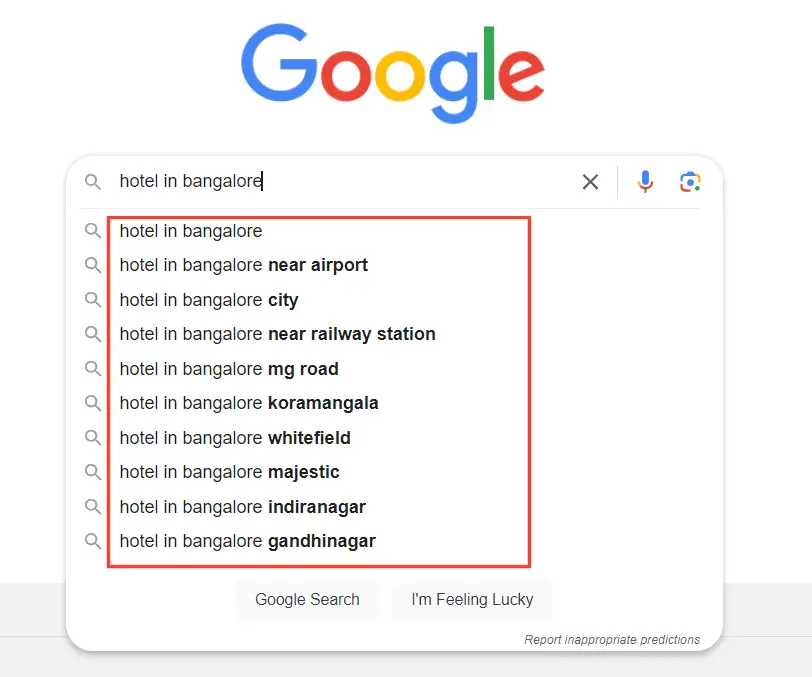
Or, you can also find keywords at the end of the front page.
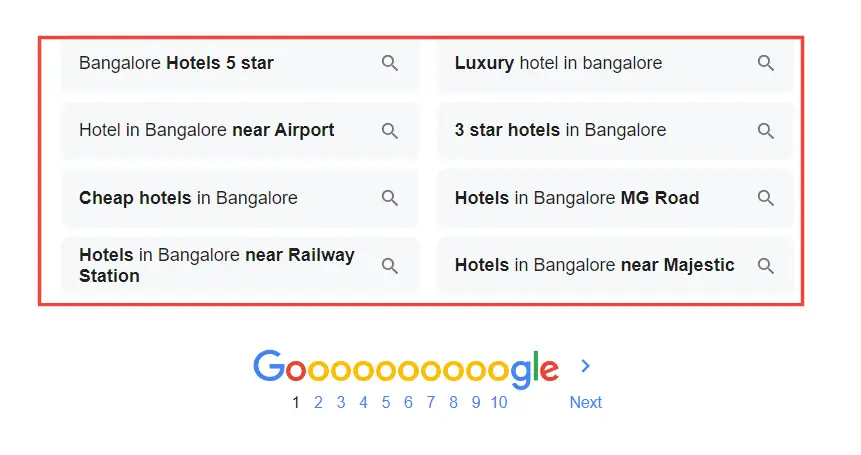
Use keyword research tools like Ahrefs, Google Keyword Planner, or Ubersuggest to further validate your choices, and divide them into primary (main focus) and secondary (related) keywords.
3) Create high-quality, user-focused content for your hotel website

Content is the key to ranking well. Make sure your content is:
a. Relevant: Matches user intent, e.g., a blog post on “Things to do in Bangalore”
b. Authoritative: Well-researched, answering all user questions.
c. Trustworthy: Ensure the content is based on reliable sources and is regularly updated.
d. Unique: Avoids duplicate content from other sites.
e. User-friendly: Easy to read and navigate, with a fast load speed.
In addition, consider creating content about your hotel’s location, nearby tourist attractions, or amenities to attract customers. Refresh this content regularly to keep it relevant and to signal to search engines that your site is active.
4) Optimise on-site elements
On-site page SEO for hotels involves optimising various elements within a webpage to enhance its search engine ranking. It’s about making content easily understandable and relevant. Its goal is not only to optimise but also to enhance the user experience. You can do this by:
a. Page titles and meta descriptions: Include your primary keywords in them.
b. Headings (H1, H2 tags): Use primary and secondary keywords appropriately.
c. URL structure: Keep it concise, clear, and don’t forget to include any relevant keywords.
d. Content (Text, images, videos): Make sure they are relevant and optimised.
e. Image alt text: Describe images accurately for both users and search engines.
5) Google Business Profile Optimisation
Google Business Profile is important for local SEO and should be thoroughly optimised. Here’s what to do:
- Claim and verify your hotel’s listing.
- Complete every section about your business and include high-quality images of your hotel.
- Detail amenities such as free Wi-Fi, parking, and any relevant policies.
Avoid keyword stuffing in any of the sections. Lastly, do not neglect review management as unresolved reviews can also harm your rankings.
It should look something like this:
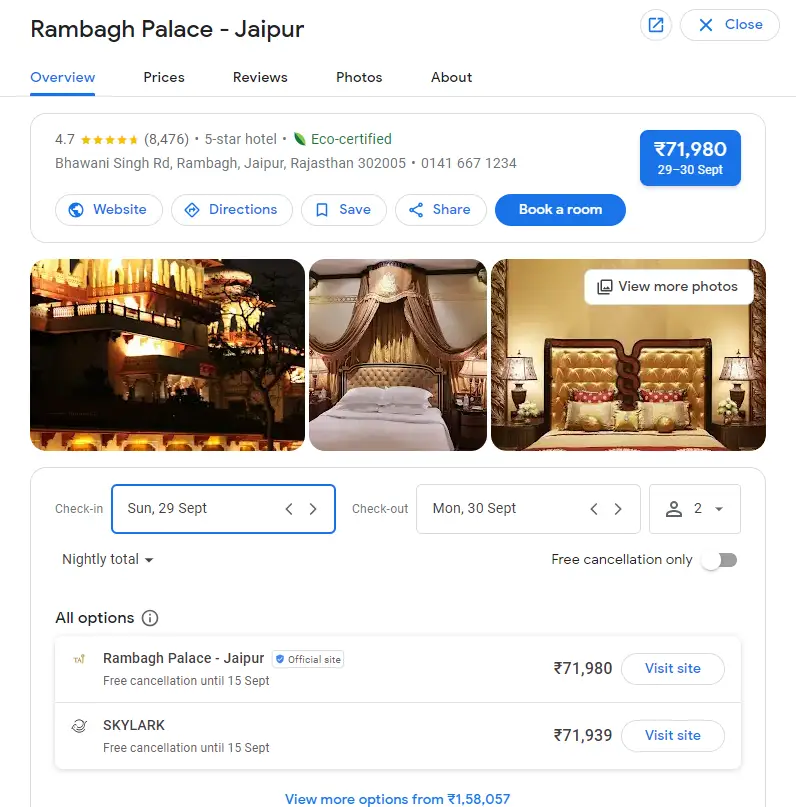
6) Optimise images
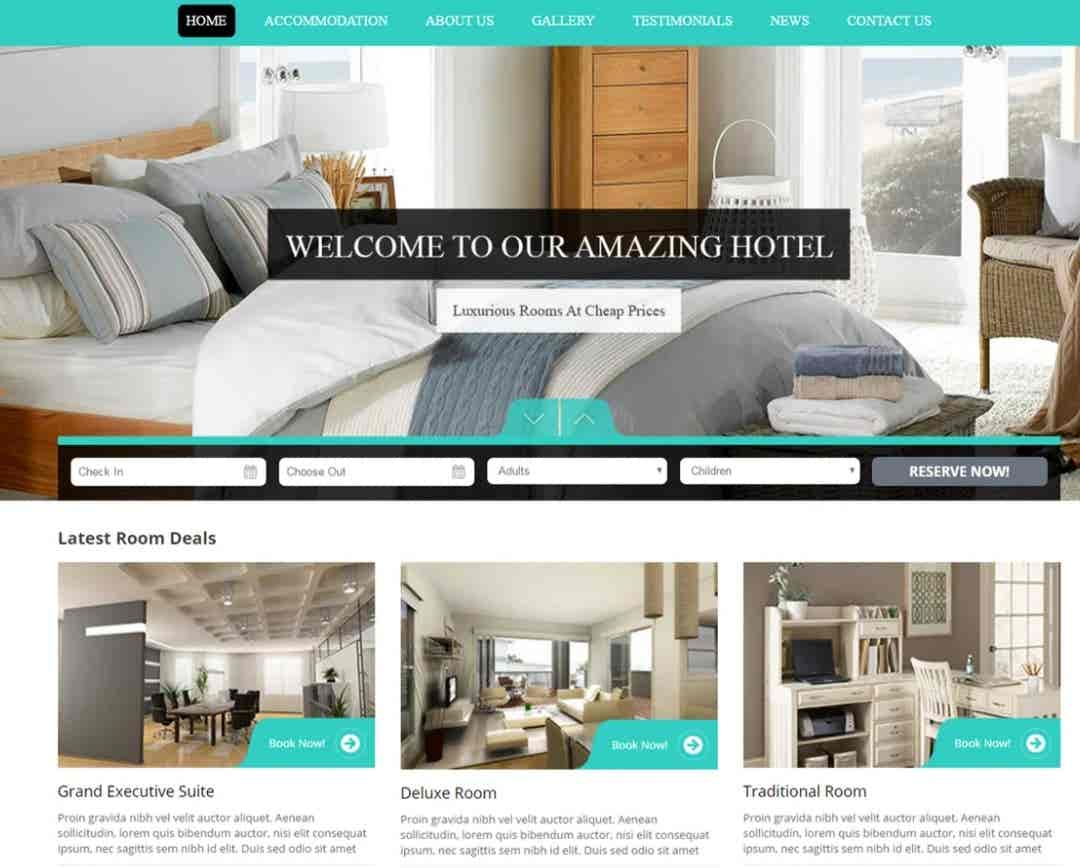
While images act a key role for hotel websites, they can slow down your site if not properly optimised. Use high-quality original photos that are compressed in size, thereby reducing load times without sacrificing quality. As mentioned above, use descriptive alt text for all images.
Use Adobe Photoshop, Squoosh, or TinyPNG for compressing images. Make sure that your alt text includes relevant keywords, but keep it natural.
7) Implement structured data
The structured data, or schema markup, helps the search engines better comprehend the content of your hotel website. It is a code you can add to your website for better visibility of your hotel in the SERPs so that your hotel appears attractive and appealing to visitors.
This includes:
a. Business schema: Provides essential details about your hotel, such as its name, address, and phone number. This ensures that search engines display these details about your hotel in search engines.
b. Accommodation schema: Details like room types, bed sizes, amenities, and pricing helps people make decisions from the search results itself.
c. Offer schema: This Promotions, deals, or pricing information can use this type of schema. This enables a search engine to display your special offer or pricing in an appealing manner to users’ eyeviews.
8) Link building for hotels
Build quality backlinks to improve your website’s authority and search rankings. One great way is reaching out to travel bloggers for a review in exchange for a complimentary stay. Some others ways:
- Listing your hotel on local and travel-specific directories like Yelp, TripAdvisor, and Booking.com.
- Partnering with local businesses or sponsoring local events to gain backlinks.
- Guest blogging on relevant travel websites.
- Create content that provides real value and insights so that others are naturally inclined to link back to it.
- Encourage guests and bloggers to review your hotel on their website, linking back to your site.
9) Make your hotel website mobile-friendly
A high percentage of the searches are now coming from mobile devices so do ensure that your website is responsive, delivers a great user experience across all devices while ensuring that all interactive elements can easily be used on smaller screens.
10) Improve page speed

A fast website appeals to not only users but search engines as well. Try cleaning up your website’s code for quick loading and enable browser caching to load previously accessed resources faster. Your audience is impatient, meaning that they are quick to exit your page if it takes too long to load— leading to high bounce rates. Check your website’s loading speed on Google Page Speed Insight.
|
Tip: Aim for a load time under two seconds to reduce bounce rates. |
Lastly, monitor your website’s performance using tools like Google Analytics and Search Console. Remember that SEO takes time, so be patient and keep adjusting and refining your approach based on data and user feedback.
Best Hotel SEO Practices and Trends
With continuous updates in search algorithms and changing user behaviors, any latest SEO trend or best practices help you stay competitive. This means, you can not only improve your visibility on the site but also meet the needs and preferences of your guests.
-
Optimise your hotel for local search SEO
If your hotel is located in a popular tourist destination, major business hub, or near key attractions, optimising it for local search attracts guests who are specifically looking for accommodations in that area. This is extremely helpful for boutique hotels or smaller chains that rely on local visibility.
When you target location-specific keywords, your hotel will appear in searches relevant to your geographical area. Getting your hotel to stand out in local search results is essential, especially in a crowded market. In addition, Google’s algorithms increasingly favour content that has local relevance and expertise.
Claim your Google Business Profile (formerly Google My Business): As discussed previously, optimise your listing and include accurate data.
Target location-specific keywords: Use Ahrefs or Google Keyword Planner to find keywords relevant to your location. Include terms like “accommodation near [landmark] or hotel in [local city].” Incorporate these keywords into your website content and create dedicated pages for different locations or neighbourhoods, if your hotel has multiple properties.
Create locally-focused content: Feature local restaurants or businesses on your website and create a network of local content. Also, promote local events or festivals on your website— encouraging visitors to stay at your hotel while they attend.
Local technical SEO: This includes building local backlinks, optimising websites for local search behaviour, and adding local schema markup.
Refer to the image below. Google displays the top three results for hotels in Bangalore near the railway station. By optimising your website, your hotel can find its place here as well!

If you’re looking to boost your local SEO, get in touch with us at BloomAgency. We’re one of the top SEO service providers for hotels.
-
Hotel content marketing
Hotel content marketing, in simple words, comes to creating and distributing valuable, relevant content to attract and retain clearly defined audiences. These can range from blog posts, videos, social media, news letters or almost everything else. Such information should be given on every platform that draws the traveler into your hotel.
This will include a content plan stating different types of content one will create, how often one is going to publish, and sources of the distributions. Remember that this content has to show what sets your hotel apart from the competition.
Secondly, share your hotel’s unique story, USP, and brand personality to create an emotional connection with your guests. Invest in professional photography and video to show your property’s best features!
And lastly, include virtual tours and regularly update your content to engage your users.
-
Hotel search optimisation
This strategy and practice is used to improve your hotel’s attractiveness in search engines and booking platforms. Consider investing in Google Hotel Ads, a paid feature to display your hotel prominently in search results.
Also, update your hotel’s location data on Google Maps and verify information to make it easier to find your hotel.
Remember to provide a smooth booking process, with visible call-to-action and friendly interface. Deploy best practices for online booking, such as mobile optimization and a straightforward checkout process.
-
Keep in mind the latest Google updates for hotels
In 2015, Google revamped the hotel search experience with a focus on visual appeal. This focuses on high-quality images, descriptions, and pricing to stand out.
A 2018 update prioritised mobile-friendly websites for indexing and ranking. Make sure to improve your site’s responsive design.
The BERT update in 2019 improved Google’s understanding of natural language, hence you must place an emphasis on using natural language in hotel descriptions and ensure the content matches user search intent.
Google’s local search updates are continuously refined, massively impacting the visibility of local businesses. This is why hotels should optimise their listings and manage online reviews.
Lastly, periodic algorithm adjustments impact your hotel’ rankings. Maintain user-centric content for a strong website experience.
-
Visual content optimisation
This tactic involves optimising images and videos on your website. This includes their quality, size, alt text, responsive design, and descriptions. Such visuals should be optimised for mobile devices, and make sure to add contextual keywords, texts, or filenames.
As you might notice in the image below, these hotels are promoted for their specific features or amenities. Hence, make sure to highlight your hotel’s USP wherever possible.
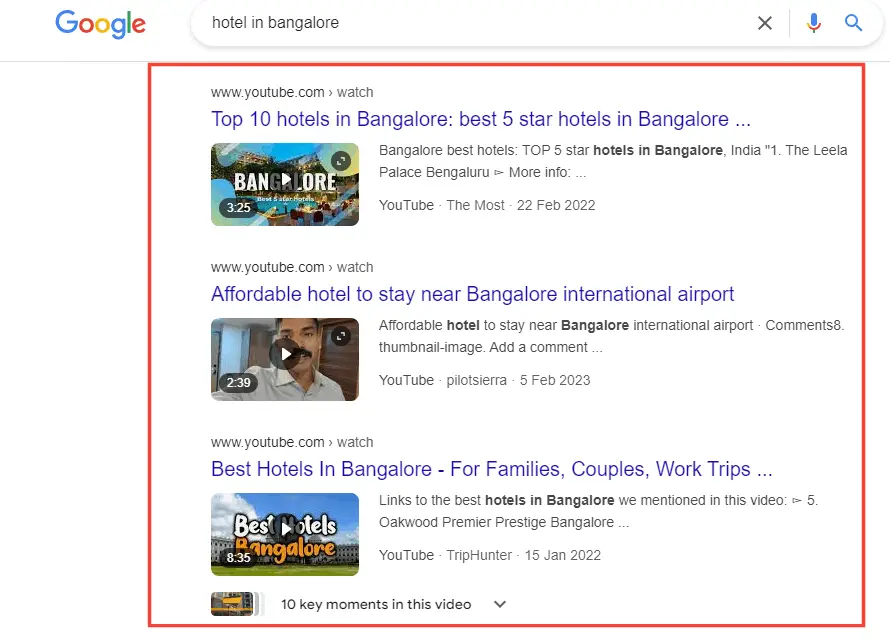
-
Leverage social proof
Social proof, such as reviews and testimonials, can further improve your hotel’s credibility. Some ways to achieve this:
- Highlight positive reviews on your website.
- Encourage guests to share their experiences on social media and tag your hotel. Feature this on your site.
- Send follow-up messages, asking guests to review your hotel on platforms.
Top tools for hotel SEO
There are various tools that specialise in different aspects of SEO. Leveraging these will give you insight into your website’s performance, understand user’s behaviour, and implement targeted strategies to attract more bookings.
Some top tools for hotel SEO are listed below. While some offer free versions, others may require you to purchase a paid version, based on the usage.
- Google Search Console
- Google Analytics
- Ahrefs
- SEMrush
- Moz Pro
- Screaming Frog
- Yoast SEO
- Majestic
- BrightEdge
- Google My Business
Where should I start with hotel SEO?
To get started with SEO for hotels, assess your current SEO performance to try identifying areas for improvement. Then, decide whether to handle SEO in-house or hire an agency.
Hiring an agency is proven to be more effective. They have specialised expertise in hotel SEO and access to all advanced tools. Such agencies deploy proven strategies and best practices as per the hospitality industry. Lastly, they optimise and adapt as per changing trends and algorithms.
This allows your team to focus on core activities.
We at Bloom Agency focus heavily on improving travel experiences by employing top quality SEO services. We provide guaranteed results, with our experts committing to genuine assurance. We also aim to meet the needs of the modern market through on-page SEO, local and technical SEO, content strategy, link building, analytics, keyword optimisation, and much, much more.
We also have demonstrated success in Hotel SEO. Take a look, and get your free proposal today. Click here.












Rahul M.
B2B Service Provider